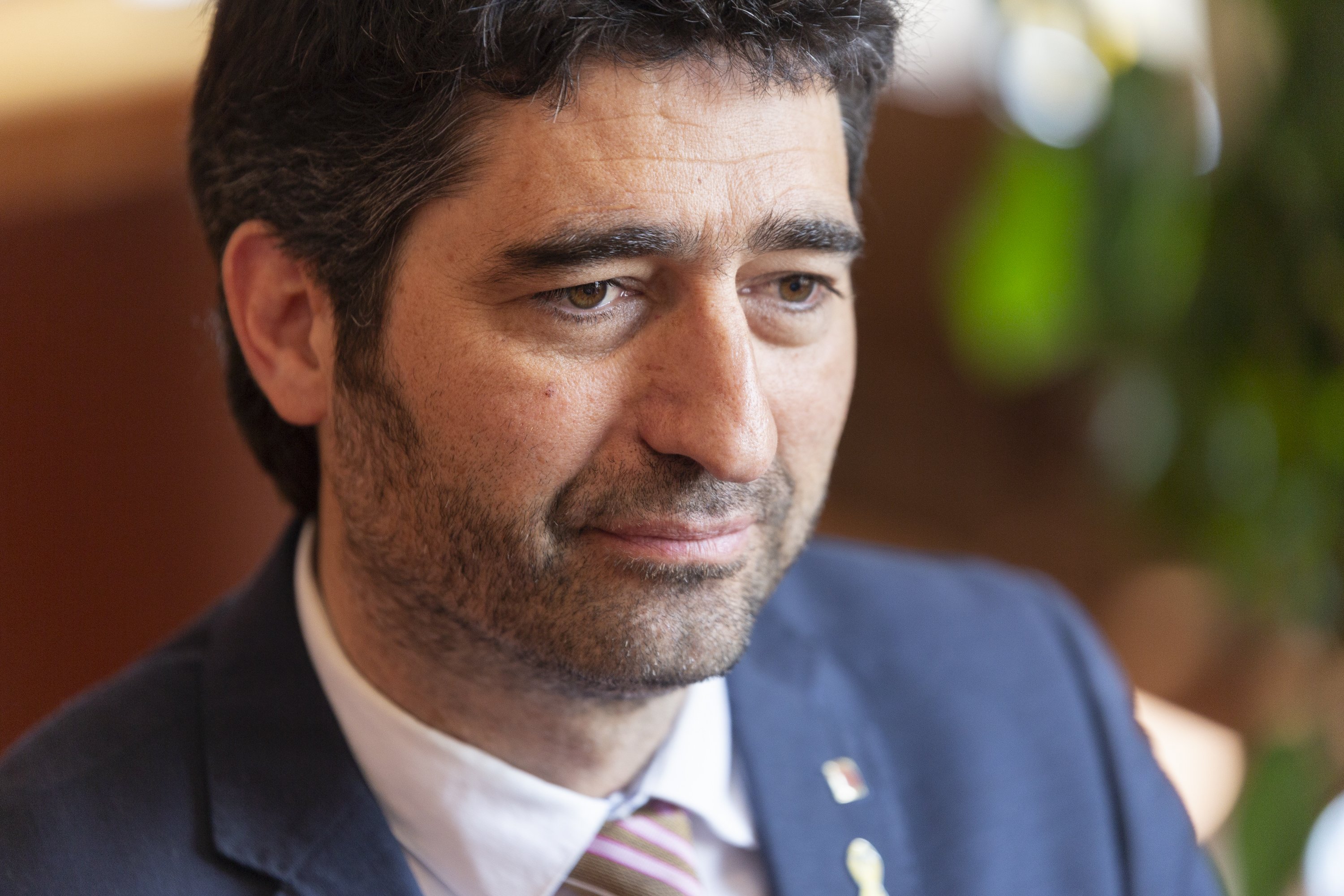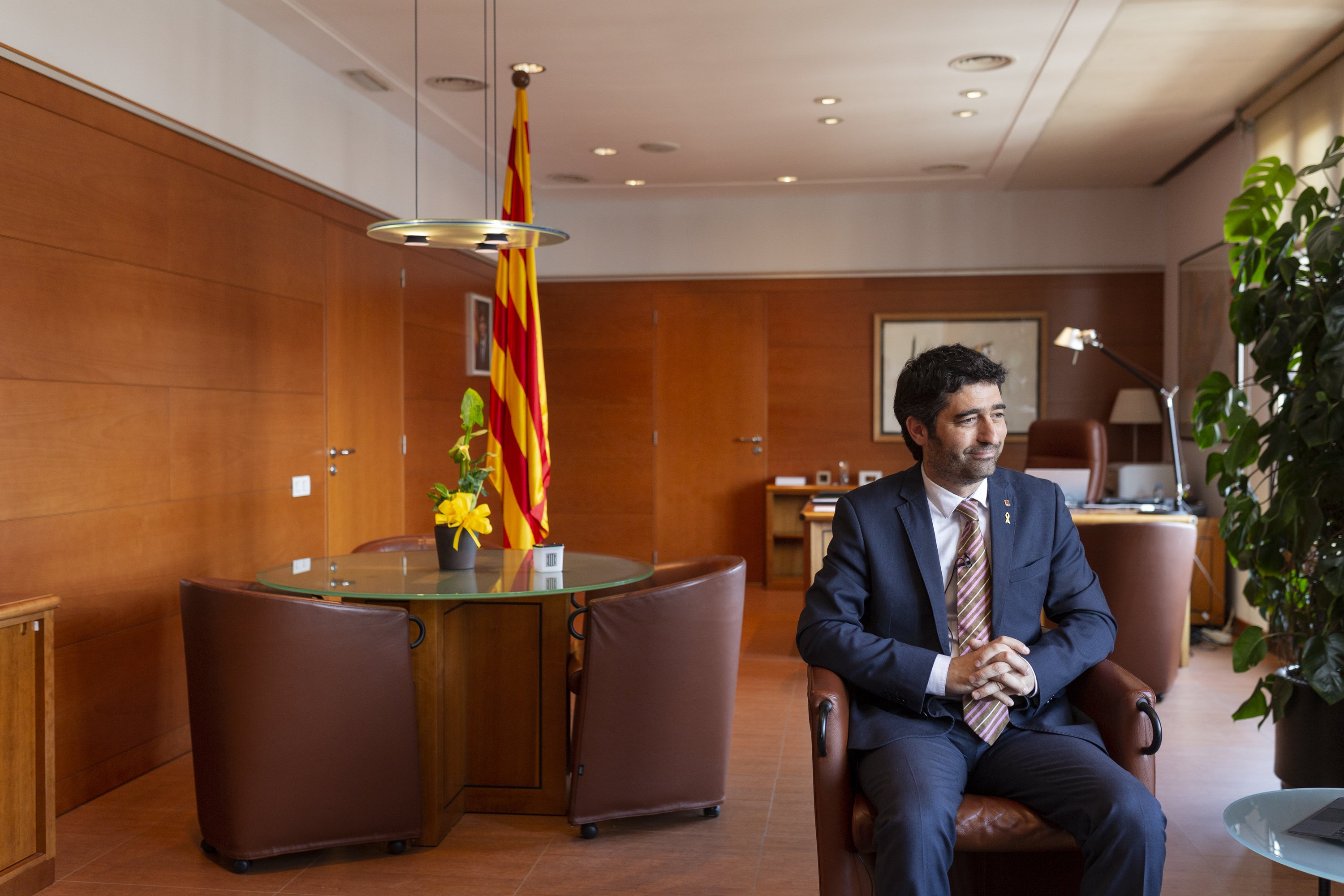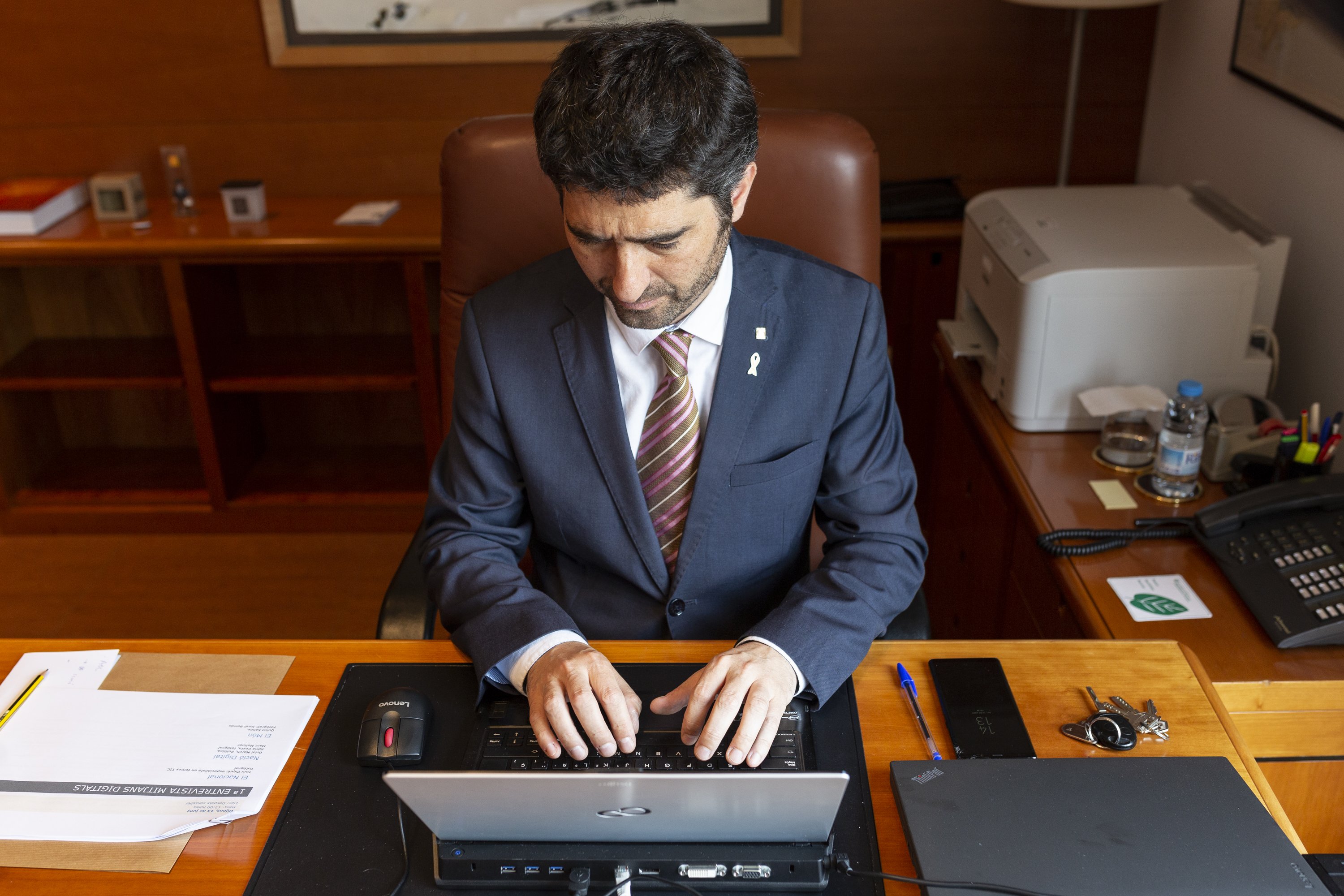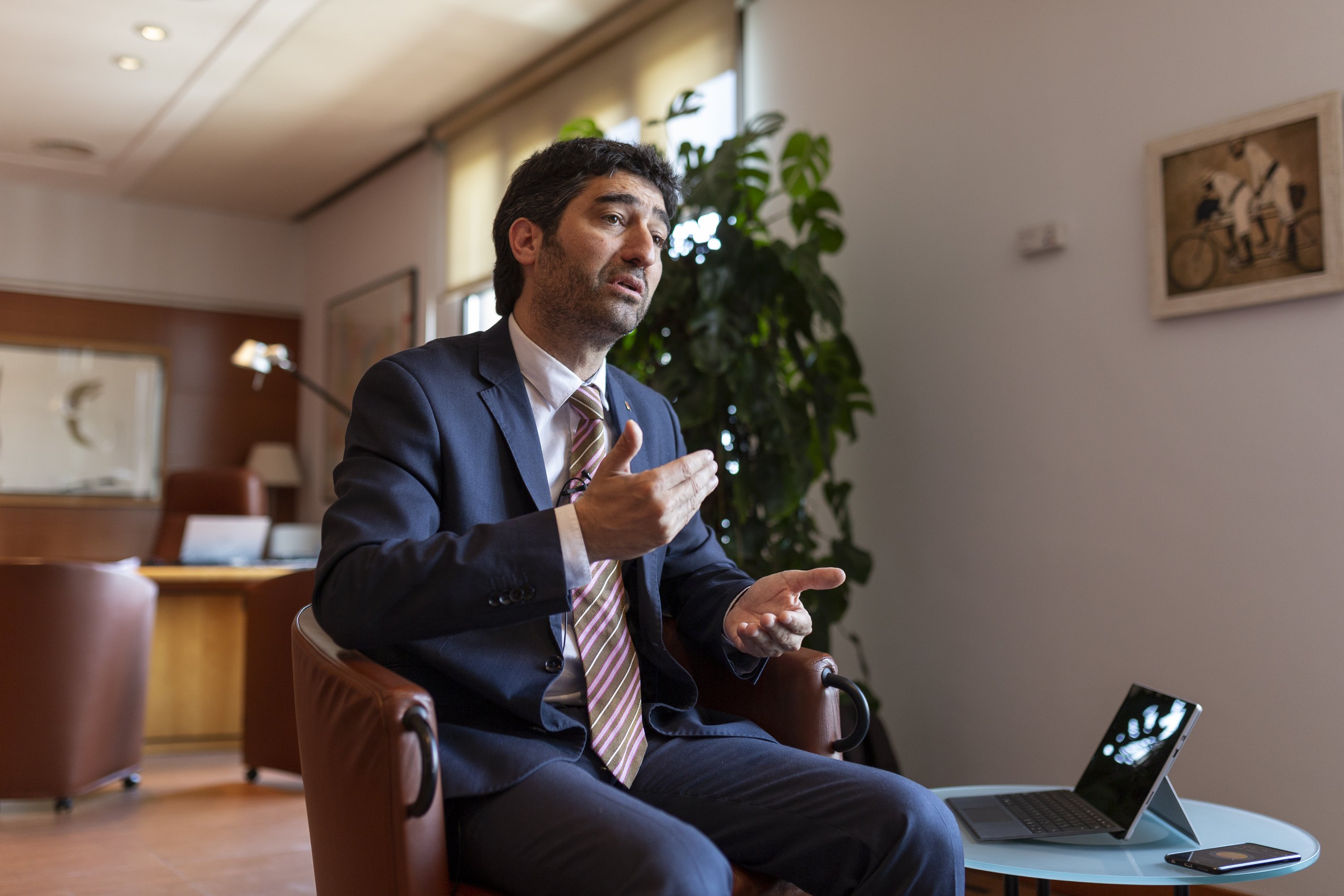Jordi Puigneró (Sant Cugat, 1974) is an engineer specialised in Information and Communication Technologies, a lover of the outdoors and a supporter of Catalan independence. A simple summary of the man is given by the name of his book: 3mils.CAT. The title says it all: the book documents a climbing expedition involving consecutive ascents of all peaks over 3,000 metres in an independent Catalonia. And it has a digital version too. Puigneró is the brand new minister of a brand new ministry - that of Digital Policy and Public Administration, in that order.
You have said that Catalonia was being run by remote control from Madrid...
People had always told us that they would send the tanks rolling down the Avinguda Diagonal and what happened at the time of the referendum was that the digital tanks rolled across the internet. Very little has been said about the digital repression of Catalonia. I sent a letter to the EU commissioner on digital policy, Andrus Ansip, at the time when Spain was closing down websites, blocking traffic, and so on, complaining that [the Spanish state] was breaching European regulations. There are computer specialists and technicians who have been arrested... I scarcely need to mention the number of times the Civil Guard has entered the Catalan government's Communications and IT Centre in recent months.
People had always told us that they would send the tanks rolling down Avinguda Diagonal and what happened was that the digital tanks rolled across the internet
I have to express my gratituude to the workers of these organisations for their dignity, because they have suffered greatly. I have also had sick leave resulting from the tension and pressure, there are people who are in judicial processes –me too – and we hope that now when people are talking about transferring the Catalan prisoners closer to home, of cooling down the repression, that they will also remember the damage done and the people involved in the digital repression.

President Puigdemont spoke during the election campaign about the “digital republic”. What does that concept mean, specifically?
This will be a digital and civic century, in which we will have new opportunities to attain the objective we are pursuing, for Catalonia to become a state. Maybe our problem is that we have attempted to build a state from the last century, a state as we have understood the concept up till now. It is probable that states in the future will be very different, and so will the way that societies are governed. We have to focus more on people and this means empowering them digitally and technologically. Not simply that people vote once every four years, but rather, so they can participate much more, both actively and passively.
Passively?
Yes. Through the data that people generate and which, in a way that is controlled and which guarantees privacy, allows digital services models to be created that will benefit the rest of society.
Like Estonia?
Exactly. We won't be doing anything that other states are not already doing. I repeat: the first goal is empowerment of citizens. The second is to have a population that is well educated in digital skills, with training processes and career paths taking into account the need for innovation to be a key element.
There are risks involved in all this.
Sure. The third element that allows us to advance towards this digital republic is to protect the digital rights and duties of citizens and their security. Up till now we have only done this in the physical environment, so to speak. If in the street, we can be robbed or murdered, or could even find ourselves in the middle of a war... it would be very difficult to create a society. We need a safe environment. The same is true on the internet. If every time we use the internet for socializing, shopping, economic activity, banking... if we are steadily living more and more of our lives on the internet, we need to guarantee that it is safe. If not, people won't trust it, they won't use it and we'll miss the train to the 21st century and lose competitiveness...
... and the job market will be greatly affected.
All revolutions that transform society from top to bottom end up generating more employment. The digital revolution will be no different. Certainly, in the transitional period we will see many jobs affected. What we have to do in the meantime is to ensure that nobody is held back: active policies for training, retraining, to direct the new generations of young people towards jobs that have a future... Now, we have to be realistic: the digital revolution is unstoppable. It is a tsunami. You can wait on the beach for it to knock you over or you can try to ride it, which seems to me to be more intelligent.

The digital republic? While the state is still running in mainframe mode, like a centralized server with clients, Catalonia has to work like the internet, with multiple nodes
One of the lessons of the referendum on 1st October is that if the universal census had not worked, if there had been no digital activism... it would not have gone ahead. Is this the model that you are thinking of?
The 1st October model was a great example of what is today known as the quadruple helix: companies, administration, universities and civil society, generating social digital innovation. This made it possible for people to vote on the 1st October. Beyond that, what ended up happening is now the focus of several investigations... In any case, it made it possible for people to vote, which was the result of the ability of Catalan society to organize itself in an environment, that of the internet, where the Spanish state probably did not foresee it. In this regard, what we have to promote in order to have this digital republic that we seek is, to use an IT image, that while the Spanish state is still running in mainframe mode, like a centralized server with clients, Catalonia has to work like the internet, with multiple nodes. Internet is the model for success. That is the right path [if] one day we want to be a state of the future, which will probably resemble the internet model more than that of the mainframe.
You talk about civil society participation. Will the constituent process [for the Catalan republic] have a telematic component?
Everything will have a telematic component! How companies are run, our daily routine... The concept of the videoconference, of networking... it changes the way we work, also in the areas of government and politics. All that we have seen these months - the argument about not being able to invest a Catalan president by telematic means - it makes no sense. It is part of the past. We have to adapt. Now that the modification of the Law of the Presidency has been reactivated, I am absolutely sure that it will contemplate a review of telematic uses in all the functions of the Catalan Parliament.
A digital republic implies a republican community. Is this government planning to create a kind of digital ID card for the citizens of this community?
Obviously, we will promote projects that have to do with the aim of creating a digital identity on which to base a series of digital services. I don't know if it will take the form of an ID card, an app... that isn't important. What we want is to promote this digital citizenship. Like Estonia, we will not restrict this just to our own Catalan citizens, but will look to the world as always... Anyone can register and become a digital citizen of Estonia in order to access certain digital services. Our idea is to advance in this same line. It would be a way of giving civil society access to a series of digital services. This project was already part of our electoral programme, it's no secret. The idea is to improve access to digital society: public participation, purchasing processes, and so on.

All of these improvements are generated by civil society, through the data that people produce, in an anonymous way and anonymized. This is a very different way of governing a country
Part of the information necessary for good government is still centralized in Madrid: census, property register, electoral roll... This hampers work in the companies in the sector. During this legislature, will steps be taken to have this data available?
Everyone has the data appropriate to their competences. This won't change. However... I will give an example. When we move around nowadays we open Google Maps or Waze [two mobility applications] and they guide us. We also generate mobility and traffic data, and this is exploited to get to know traffic patterns: if there are traffic hold-ups, if we have to change route... So, who provides us with mobility information and data? It is civil society itself who does this - the people provide the data themselves which ends up favouring mobility in general. The same thing can be done in the field of mobile coverage —and we have done it. It is the citizens themselves who induce all these improvements, through the data that people produce, in an anonymous way and anonymized. This is a very different way of governing a country.
And what part does the government play?
It provides the tools, creates digital culture... This can allow us to have new forms of governance. All this can also be applied to the area of health, and in many other areas of what we would call the society of well-being. When we speak about creating a digital republic we are also talking about this, about improving the country.
So are you in favour of banning mobile phones from schools, as France has just done?
A ban is not a good solution. What we have to do is to educate in these new technologies. We have to adapt to what mobile phones mean... It is a matter of educating in the use of these tools, to regulate their use in class... They will be the tools that [students] will use in their future work and also socially.

This interview was conducted jointly with El Mon and Nació Digital.

